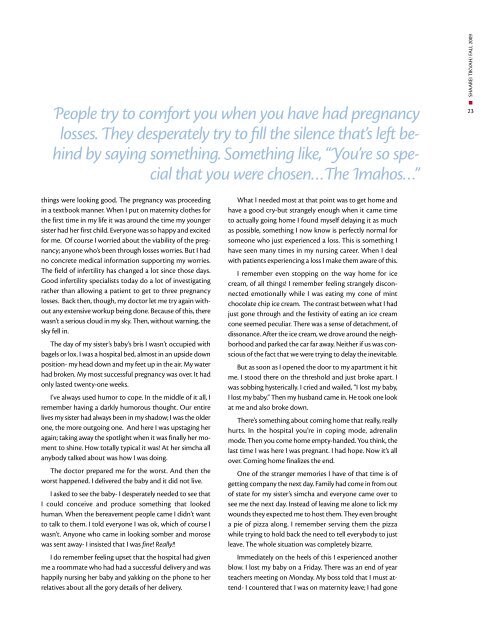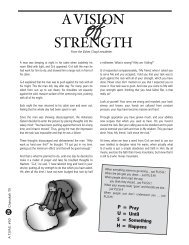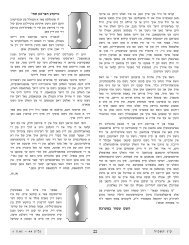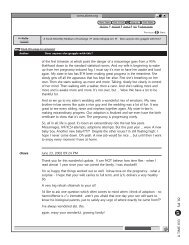Rosh Hashana 5770/2009 - Jewish Infertility
Rosh Hashana 5770/2009 - Jewish Infertility
Rosh Hashana 5770/2009 - Jewish Infertility
You also want an ePaper? Increase the reach of your titles
YUMPU automatically turns print PDFs into web optimized ePapers that Google loves.
People try to comfort you when you have had pregnancy<br />
losses. They desperately try to fill the silence that’s left behind<br />
by saying something. Something like, “You’re so special<br />
that you were chosen…The Imahos…”<br />
SHAAREI TIKVAH/ FALL <strong>2009</strong><br />
23<br />
things were looking good. The pregnancy was proceeding<br />
in a textbook manner. When I put on maternity clothes for<br />
the first time in my life it was around the time my younger<br />
sister had her first child. Everyone was so happy and excited<br />
for me. Of course I worried about the viability of the pregnancy;<br />
anyone who’s been through losses worries. But I had<br />
no concrete medical information supporting my worries.<br />
The field of infertility has changed a lot since those days.<br />
Good infertility specialists today do a lot of investigating<br />
rather than allowing a patient to get to three pregnancy<br />
losses. Back then, though, my doctor let me try again without<br />
any extensive workup being done. Because of this, there<br />
wasn’t a serious cloud in my sky. Then, without warning, the<br />
sky fell in.<br />
The day of my sister’s baby’s bris I wasn’t occupied with<br />
bagels or lox. I was a hospital bed, almost in an upside down<br />
position- my head down and my feet up in the air. My water<br />
had broken. My most successful pregnancy was over. It had<br />
only lasted twenty-one weeks.<br />
I’ve always used humor to cope. In the middle of it all, I<br />
remember having a darkly humorous thought. Our entire<br />
lives my sister had always been in my shadow; I was the older<br />
one, the more outgoing one. And here I was upstaging her<br />
again; taking away the spotlight when it was finally her moment<br />
to shine. How totally typical it was! At her simcha all<br />
anybody talked about was how I was doing.<br />
The doctor prepared me for the worst. And then the<br />
worst happened. I delivered the baby and it did not live.<br />
I asked to see the baby- I desperately needed to see that<br />
I could conceive and produce something that looked<br />
human. When the bereavement people came I didn’t want<br />
to talk to them. I told everyone I was ok, which of course I<br />
wasn’t. Anyone who came in looking somber and morose<br />
was sent away- I insisted that I was fine! Really!!<br />
I do remember feeling upset that the hospital had given<br />
me a roommate who had had a successful delivery and was<br />
happily nursing her baby and yakking on the phone to her<br />
relatives about all the gory details of her delivery.<br />
What I needed most at that point was to get home and<br />
have a good cry-but strangely enough when it came time<br />
to actually going home I found myself delaying it as much<br />
as possible, something I now know is perfectly normal for<br />
someone who just experienced a loss. This is something I<br />
have seen many times in my nursing career. When I deal<br />
with patients experiencing a loss I make them aware of this.<br />
I remember even stopping on the way home for ice<br />
cream, of all things! I remember feeling strangely disconnected<br />
emotionally while I was eating my cone of mint<br />
chocolate chip ice cream. The contrast between what I had<br />
just gone through and the festivity of eating an ice cream<br />
cone seemed peculiar. There was a sense of detachment, of<br />
dissonance. After the ice cream, we drove around the neighborhood<br />
and parked the car far away. Neither if us was conscious<br />
of the fact that we were trying to delay the inevitable.<br />
But as soon as I opened the door to my apartment it hit<br />
me. I stood there on the threshold and just broke apart. I<br />
was sobbing hysterically. I cried and wailed, “I lost my baby,<br />
I lost my baby.” Then my husband came in. He took one look<br />
at me and also broke down.<br />
There’s something about coming home that really, really<br />
hurts. In the hospital you’re in coping mode, adrenalin<br />
mode. Then you come home empty-handed. You think, the<br />
last time I was here I was pregnant. I had hope. Now it’s all<br />
over. Coming home finalizes the end.<br />
One of the stranger memories I have of that time is of<br />
getting company the next day. Family had come in from out<br />
of state for my sister’s simcha and everyone came over to<br />
see me the next day. Instead of leaving me alone to lick my<br />
wounds they expected me to host them. They even brought<br />
a pie of pizza along. I remember serving them the pizza<br />
while trying to hold back the need to tell everybody to just<br />
leave. The whole situation was completely bizarre.<br />
Immediately on the heels of this I experienced another<br />
blow. I lost my baby on a Friday. There was an end of year<br />
teachers meeting on Monday. My boss told that I must attend-<br />
I countered that I was on maternity leave; I had gone
















